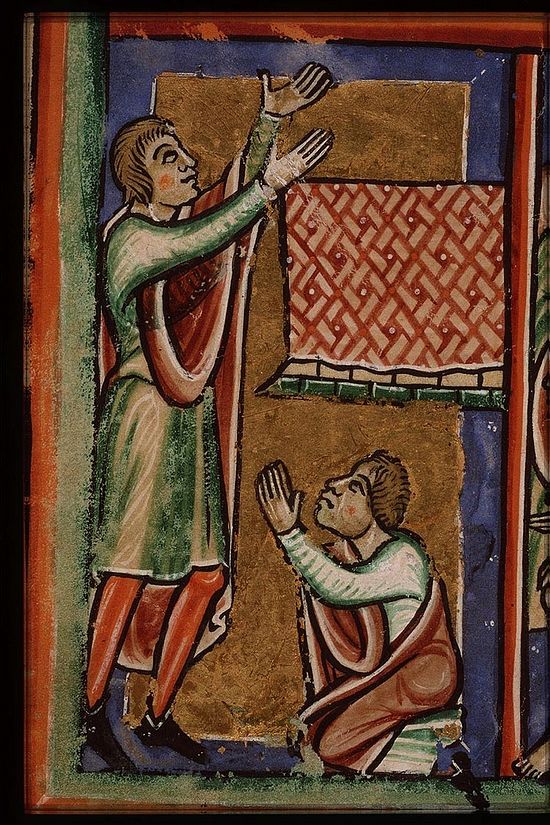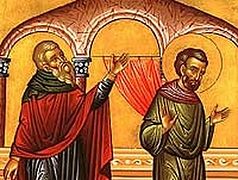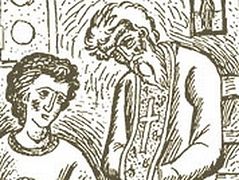When we are in the beginning of the spiritual life, notes St. Paisius of Mount Athos—and aren't we all beginngers—as we advance in the spiritual life, we shouldn't study a lot but instead, watch ourselves and observe our thoughts.
We see this watchfulness in today's Gospel reading. Here, Christ presents us with a mirror: the parable of a Publican and a Pharisee.
This is really a parable about ourselves. The Pharisee, studying other people instead of himself, doesn't hear the will of God. And yet, we may tell ourselves, we're not this Pharisee. We tell ourselves we're the model Publican, and yet by not identifying with the Pharisee, not seeing or admitting our tendency to judge, we become Pharisaical.
Too often, we mostly identify with the airport on top of our head. This airport welcomes compulsive thoughts taking off, landing, circling around us. We're constantly debating with ourselves, assessing everything. Whether good or bad, the fact our will is independent says we're not in harmony with God. Most of us don't hear God speaking in our midst because we're tuned in to this airport.
So we mustn't identify with these thoughts—don't give them room to land. Don't enter into debate. We ought to, really, avoid criticizing not only others, but even situations. Judging situations is a symptom of our blindness, our pride, because we assume we know God's will, His plan for our lives, and for the life of the world. We do not know His will, really, and to assess every situation suggests we know what's best for ourselves.
Now this isn't to say we aren't wise, that we don't discern—because certainly, the Orthodox Church isn't morally relativistic, it isn't altogether subjective—Truth isn't abstract speculation, Truth isn't just opinion—Truth is a Person—and this requires relationship, right relationship, and love.
The Publican's prayer reveals this relationship—not only does the Publican turn his thoughts away in order to apprehend the mercy of God but he barely lifts his gaze from himself. Each time a thought arrives, we must acknowledge this and return to our gaze to the heart, to the kingdom of God.
St. John the Evangelist tells us Christ stands at our door, knocks, and if we hear Him, which means looking past our mind and it's flighty thought patterns, and invite Christ in, then Christ breaks bread with us. When we offer ourselves, we receive Christ Who always offers Himself. It's as though we clear a spot at the dinner table for Him.
Attending these services doesn't merely suggest physical presence, although this is good—attending services of our Church implies attending to them mindfully, in spirit and in truth. This really requires us to let go of all earthly cares, because if we don't hear Him, if we're caught up in compulsive thinking, we're not returning to God. And this returning to God is precisely repentance.
Christ's first Gospel message is Repent, for the kingdom of God is at hand. We hear this call for return all through the Old Testament, from Adam to Moses on through the Prophets leading into St. John the Forerunner, this is the sum of our history: turning to God, returning to our Father's country. But we must get out of our heads. It isn't enough to think about spending time with our spouse; it isn't enough to even be at the same dinner table and never offer our attention, our ear, our heart—we must be completely given over to our spouse. This is true love, to return to our Beloved, to Christ. If we do this, if we begin the slow climb up Sinai, up Tabor, up Golgotha—our movement begins in a valley and ascends higher and higher to meet our risen Lord—if we return to Him, we partake of Him.
Nevertheless, and we'll emphasize this again, if we're studying and judging everything, updating everyone about ourselves, or who we think we are, we become self-absorbed, rather than absorbed in God.
Last Sunday, we joined little Zacchaeus in a leafy sycamore tree, eager to see Christ approaching. This is how we're transfigured: by abandoning ourselves to Christ, turning to Christ, running to Him with open arms, trying to get to know Him. Through love of brother, we arrive at love for God. This is our journey through Lent: seeking vision of God. Vision of God is true Orthodox theology—it isn't speculative, academic, and certainly doesn't come about by studying anything other than our own heart, calling out to Christ, and beholding Him in actuality, looking for Him, saying continually with the Publican:
God, be merciful to me, I am a sinner!





Become like St. Athanasius the Great renowned in knowledge and wisdom because of your 'aquisition' of the Holy Spirit. If you do not do this, you have everything to lose.